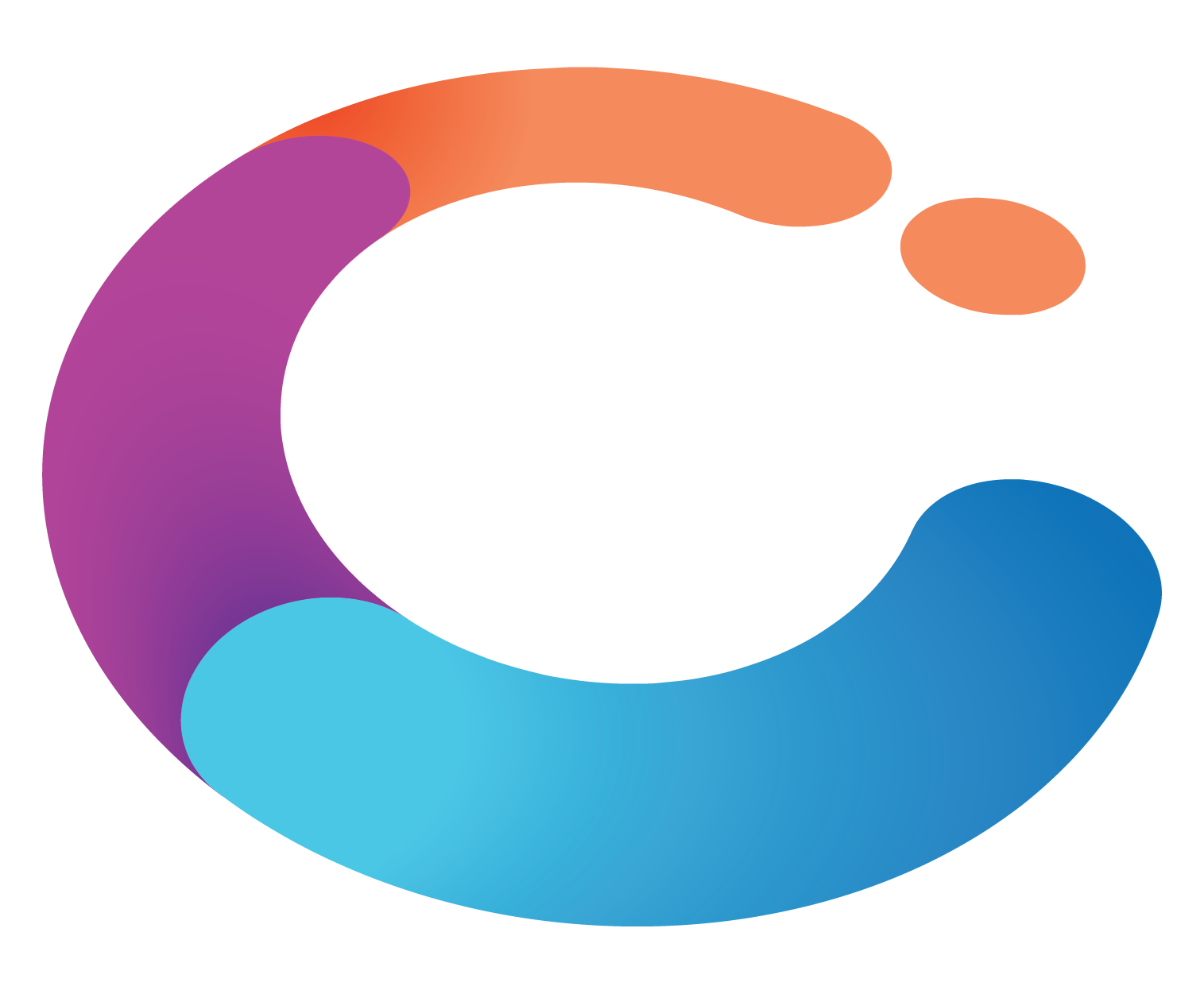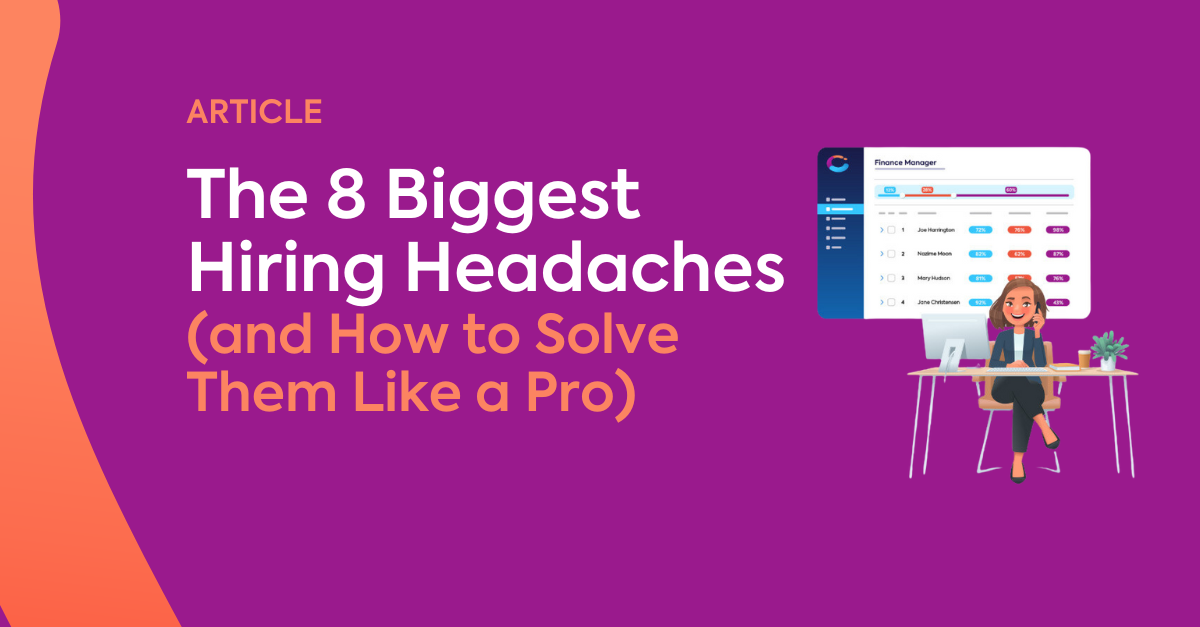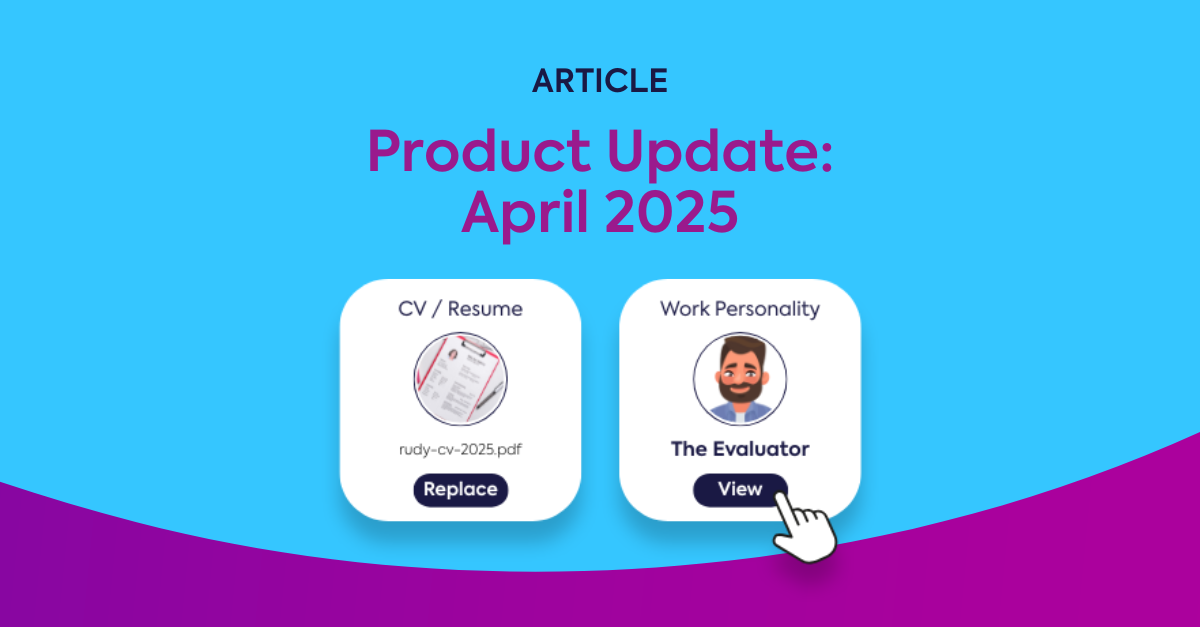Best Practices for Asking Great Interview Questions: Proven Strategies for HR Managers
The article delineates best practices for HR managers in formulating effective interview questions that evaluate both candidate qualifications and...
Become the expert on delivering
valid and fair assessments for
your training and education.
Hire
|
Engage
|
Develop
|
|
Automatically match to candidates who are a great fit for your team culture and who are intrinsically motivated to succeed. |
Deeply understand your organisation with science-backed analytics on your culture, team design, and engagement. |
Back your onboarding, compliance and skill development with industry-leading credentialling, competency and capability expertise.
|
.png?width=383&height=200&name=team%20(1).png)
8 min read
 Compono
Apr 24, 2025 5:23:30 PM
Compono
Apr 24, 2025 5:23:30 PM

The article provides guidance to candidates on how they can structure their interview responses to increase their chances of success and confidence, especially by using the STAR method and ensuring that they are in line with the company culture. It also emphasizes the need for preparation which includes:
Such preparation is crucial for candidates to stand out, especially given that a large number of resumes are eliminated during the initial screening process. This underscores the need for effective and persuasive communication.
Job seekers and hiring managers need to master interview procedures to succeed in today's competitive job market. The changing recruitment environment requires full comprehension of interview stages together with preparation for typical interview questions to achieve better results. The interview process from initial screenings to structured interviews now places greater importance on personal interaction and fair evaluations than ever before.
Organisations now understand the value of matching candidate answers to their company culture and values which requires candidates to develop effective preparation methods. Candidates who use the STAR method and conduct mock interviews can develop their interview approach to convert challenging situations into productive conversations.
This article provides detailed information about the interview process together with practical advice to help individuals succeed during this essential phase with confidence.
The proper understanding of the selection process remains essential for candidates and hiring officials. A typical interview process begins with screening followed by a formal meeting then potentially ends with an additional meeting. The evaluation process consists of multiple steps which help both assess candidates' qualifications for specific positions and organisation alignment. The interview typically contains several standard questions that follow:
Applicants who want to get ready for these questions need to research them in relation to the job description so they can provide responses that highlight their relevant skills and experiences. Emphasising communication skills and past sales achievements becomes beneficial when seeking a sales position.
Interviews using structured questioning methods have become more popular because face-to-face interviews increased from 17% to 64% in 2023. The changing landscape shows that human connexion remains vital in recruitment while standard evaluation methods and psychological assessments result in better candidate assessments. Job evaluations rank as the second most important factor for job seekers to accept job offers after salary according to current statistics.
The historical failure of managers to prepare for hiring procedures has prevented strategic business planning according to expert analysis. The United States experienced more than 35 years of ineffective business strategies due to untrained hiring managers according to Russ Riendeau who serves as Senior Partner and Chief Behavioural Scientist but this problem remains unacknowledged as a vital factor. Organisations need to invest in training to develop better recruitment practises.
A combination of structured interviews and psychological evaluations at The Coffee Club enabled them to shorten their hiring duration by 35% and boost first-year employee retention by 20%. The implementation of a well-organised assessment process proves its capability to build cohesive teams.
When applying for positions job seekers need to watch out for typical mistakes during their interview process. Older candidates beyond age 55 face a threefold decrease in obtaining interview invitations compared to younger candidates vying for the same role. The statistical data shows why organisations need to establish unbiased hiring procedures that give all applicants equal opportunities across the board.
The use of complete interview question lists together with successful preparation methods will improve the delivery of strong interview responses. A thorough understanding of selection procedures combined with proven best practises enables both applicants and HR managers to achieve success throughout this essential phase.

The STAR method presents a useful framework for organising responses by dividing them into Situation, Task, Action, and Result segments. This technique allows people to claim responsibility for their experiences so they can present them confidently, which boosts their interview answer quality. Candidates who use Compono's scientific understanding of organisational culture and employee engagement will better match their responses to hiring organisation requirements while benefiting from Compono's services that improve recruitment through company culture mapping and team design.
In this section describe the workplace context where you performed the work assignment or faced the obstacle at your job. Your response requires this initial foundation to proceed.
Explain the specific task or problem which occurred during your experience. You should define the specific requirements which applied during that particular situation.
Describe the particular steps you implemented to tackle the task or challenge. Your decision-making process and capabilities become evident through this part of your response.
The Result section presents your outcome along with quantifiable achievements wherever possible. When you present concrete numbers in your response, it will automatically boost the effectiveness of your answer.
When describing your project leadership experience you should explain: "My previous role (Situation) required me to lead a team toward better customer satisfaction results (Task). My team received training on customer engagement strategies and I established a new feedback system which led to satisfaction ratings increasing by 20% during a six-month period (Result)." The STAR method provides a structured framework to organise your thoughts which allows you to effectively demonstrate your accomplishments through your responses.
The STAR technique along with other organised response strategies helps candidates produce interview good answers that lead to higher success rates during discussions according to statistical data. A recruiter who consistently contacts job applicants boosts their chances of job acceptance by 89 percent because structured responses with clear communication work well for hiring managers. It is vital to recognise the difficulties which candidates encounter during their job search process. The pressure to change appearance before job meetings affects 74% of Hispanic Americans who seek employment. The hiring process reveals age-related biases because interview invitations go to younger candidates three times more frequently than to applicants older than 55.
The travel business case study shows recruiters why cultural compatibility remains vital for successful candidate selection. They achieved better retention and team cohesion by creating cultural maps to match applicants with their unique organisational culture. The STAR response method along with structured communication enables candidates to better fit organisational needs according to Compono's mission which focuses on optimising organisational design and workforce development.
The STAR method helps you prepare better for interviews by creating coherent and persuasive responses that attract potential employers.
We don’t just help businesses find the right people.
We help you find the right fit.

Discover your Work Personality
✅ Access insights to grow your career
✅ Get matched to roles where you’ll thrive
Your first step to match your responses with an organisation's culture and values should involve extensive research. Check the organisation's website to view their mission statement while examining their social media platforms to understand their fundamental values. Your responses should integrate the company values naturally while providing effective answers during the interview process. Your ability to work well with teams becomes evident through your experience on a cross-departmental project which needed contributions from multiple teams. The experience showed me that diverse perspectives lead to common goal achievement.
When preparing your questions make sure to demonstrate your interest in organisational culture by asking for examples of how team members demonstrate organisational values throughout their daily work. Your genuine interest becomes evident through this approach which also enables you to evaluate cultural alignment with your personal values.
Organisations that develop a strong workplace culture see their employee satisfaction with work experience grow by 102%. Cultural alignment during discussions proves essential because employees who share organisational values tend to create positive contributions to their workplace. Organisations that focus on cultural alignment during discussions achieve better employee retention outcomes. A recent study showed that a customer achieved better employee satisfaction and retention after implementing targeted interventions based on cultural assessments during their restructure process.
Your responses that match the company values during the meeting will give you good interview answers while demonstrating your strong candidacy and supporting a unified workplace culture. The evolution in recruitment approaches using psychometrics demonstrates how compassionate leadership and humanitarian values create better employee engagement.

Verbal repetition serves as the practise method to develop discussion confidence. You should develop interview good answers through practise sessions with friends or mentors who provide beneficial feedback. Your delivery of confidence requires both maintaining eye contact and positive body language together with clear speech. Your delivery method will benefit from self-recording because it enables you to evaluate your tone and pacing. You should keep your interview good answers brief yet direct while using feedback to improve their content.
The initial screening process eliminates 75% of resumes thus proving that job candidates need to stand out throughout all evaluation stages. The high number of unsuccessful resumes in initial screenings shows that interview response practise enables candidates to gain needed confidence to make strong first impressions. The execution of practise sessions as part of programmes results in substantial performance enhancements for candidates.
The Coffee Club achieved a 35% decrease in hiring duration and maintained a 20% increase in first-year employee retention by changing their recruitment process through Compono Hire thus demonstrating the effect of thorough preparation.
To create effective interview responses you need to prepare answers to unexpected questions. When asked to identify a weakness you should answer that excessive detail focus led you to establish specific time limits for yourself to stay productive. The answer demonstrates your self-awareness together with your commitment to personal development. The interviewers frequently ask job candidates to describe an obstacle they faced at work. The STAR method (Situation, Task, Action, Result) enables you to construct a detailed story that shows your problem-solving capabilities when responding to unexpected questions in the interview.
The coaches at Carrus.io recommend implementing these strategies during preparation to help you transition from stressful discussions into collaborative conversations. Candidates should use these findings to conduct mock interviews while approaching job interviews as conversations instead of assessment exams. Your effective practise of responses creates confidence growth and produces improved interview good answers which enhance your job acquisition prospects.

The interview process requires mastery from both candidates and hiring managers because of current market competition. The different interview stages from initial screenings through structured formats provide candidates with essential knowledge to succeed in this crucial phase. Candidates who use the STAR method and match their answers to company culture effectively demonstrate their abilities and organisational compatibility while avoiding typical hiring biases.
Preparation is paramount. Mock interview practise combined with response preparation develops both confidence levels and communication abilities which result in positive first impressions for potential employers. Interviews that combine personal interaction with structured evaluations demonstrate how preparation leads to successful outcomes. Organisations that train their hiring managers and focus on cultural alignment achieve better employee satisfaction and retention results.
The interview process functions beyond evaluation because it creates meaningful dialogue between job applicants and employers. Candidates who prepare before interviews and understand their own strengths will turn interview stress into productive dialogues which leads to better job prospects. These strategies will benefit individual job seekers while creating a fairer and more efficient hiring system.
What is the typical interview process?
The typical interview process begins with screening, followed by a formal meeting, and may end with an additional meeting.
What are the standard questions commonly asked in interviews?
Common interview questions include: "Tell me about yourself," "Which of your strengths and weaknesses can help you provide great interview answers during your application?" and "Describe a difficult situation that occurred while you provided effective solutions during the interview."
How should applicants prepare for interview questions?
Applicants should research the questions in relation to the job description to provide responses that highlight their relevant skills and experiences, particularly emphasising communication skills and past achievements relevant to the position.
What trend has been observed in the interview process in 2023?
Structured questioning methods have become more popular, with face-to-face interviews increasing from 17% to 64% in 2023, indicating the importance of human connexion in recruitment.
What is the second most important factor for job seekers when accepting job offers?
Job evaluations rank as the second most important factor for job seekers to accept job offers, following salary.
What issue has historically affected hiring procedures in the United States?
The historical failure of managers to prepare for hiring procedures has led to ineffective business strategies for over 35 years, according to expert analysis.
How can organisations improve their hiring practices?
Organisations need to invest in training to develop better recruitment practices, including structured interviews and psychological evaluations.
What results did The Coffee Club achieve by implementing structured interviews and psychological evaluations?
The Coffee Club shortened their hiring duration by 35% and boosted first-year employee retention by 20% through a well-organised assessment process.
What mistakes should job seekers be aware of during the interview process?
Older candidates beyond age 55 face a threefold decrease in obtaining interview invitations compared to younger candidates vying for the same role, highlighting the need for unbiased hiring procedures.
How can applicants improve their interview responses?
Using complete interview question lists and successful preparation methods will enhance the delivery of strong interview responses, supported by a thorough understanding of selection procedures and best practices.

The article delineates best practices for HR managers in formulating effective interview questions that evaluate both candidate qualifications and...

Whether you’re leading a thriving business or managing an HR department, chances are you’ve faced the uphill battle of hiring. It’s a process with...

The article provides an overview of effective hiring practices by presenting sample interview questions and responses that enhance the recruitment...

The article provides a comparative analysis of recruitment software solutions, focusing on their features and effectiveness in streamlining the...

Effective interview questions are essential for evaluating candidates' qualifications, thought processes, and cultural fit. By focusing on...

Follow our monthly product updates as we share the latest features to help you strategically design and develop teams and the work environment. ...